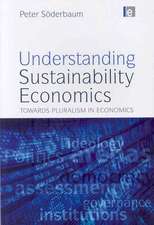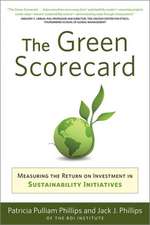Consumer Energy Conservation Behavior After Fukushima: Evidence from Field Experiments: SpringerBriefs in Economics
Autor Isamu Matsukawaen Limba Engleză Paperback – 23 mai 2016
Din seria SpringerBriefs in Economics
-
 Preț: 444.35 lei
Preț: 444.35 lei -
 Preț: 264.79 lei
Preț: 264.79 lei - 15%
 Preț: 462.51 lei
Preț: 462.51 lei -
 Preț: 47.33 lei
Preț: 47.33 lei -
 Preț: 353.14 lei
Preț: 353.14 lei -
 Preț: 273.32 lei
Preț: 273.32 lei -
 Preț: 376.04 lei
Preț: 376.04 lei -
 Preț: 379.09 lei
Preț: 379.09 lei -
 Preț: 380.07 lei
Preț: 380.07 lei -
 Preț: 377.35 lei
Preț: 377.35 lei -
 Preț: 379.09 lei
Preț: 379.09 lei -
 Preț: 376.59 lei
Preț: 376.59 lei -
 Preț: 408.27 lei
Preț: 408.27 lei -
 Preț: 379.09 lei
Preț: 379.09 lei -
 Preț: 383.28 lei
Preț: 383.28 lei -
 Preț: 378.54 lei
Preț: 378.54 lei -
 Preț: 377.95 lei
Preț: 377.95 lei -
 Preț: 340.23 lei
Preț: 340.23 lei -
 Preț: 380.25 lei
Preț: 380.25 lei -
 Preț: 378.12 lei
Preț: 378.12 lei -
 Preț: 376.04 lei
Preț: 376.04 lei -
 Preț: 376.04 lei
Preț: 376.04 lei -
 Preț: 379.68 lei
Preț: 379.68 lei -
 Preț: 381.00 lei
Preț: 381.00 lei -
 Preț: 375.23 lei
Preț: 375.23 lei -
 Preț: 376.80 lei
Preț: 376.80 lei -
 Preț: 378.54 lei
Preț: 378.54 lei -
 Preț: 377.57 lei
Preț: 377.57 lei -
 Preț: 376.04 lei
Preț: 376.04 lei -
 Preț: 378.92 lei
Preț: 378.92 lei -
 Preț: 375.62 lei
Preț: 375.62 lei -
 Preț: 379.09 lei
Preț: 379.09 lei -
 Preț: 353.67 lei
Preț: 353.67 lei -
 Preț: 342.14 lei
Preț: 342.14 lei -
 Preț: 375.45 lei
Preț: 375.45 lei -
 Preț: 379.09 lei
Preț: 379.09 lei -
 Preț: 377.35 lei
Preț: 377.35 lei -
 Preț: 344.86 lei
Preț: 344.86 lei -
 Preț: 377.35 lei
Preț: 377.35 lei -
 Preț: 345.89 lei
Preț: 345.89 lei -
 Preț: 377.57 lei
Preț: 377.57 lei -
 Preț: 343.83 lei
Preț: 343.83 lei -
 Preț: 378.12 lei
Preț: 378.12 lei -
 Preț: 345.06 lei
Preț: 345.06 lei -
 Preț: 379.48 lei
Preț: 379.48 lei -
 Preț: 379.48 lei
Preț: 379.48 lei -
 Preț: 380.07 lei
Preț: 380.07 lei -
 Preț: 375.45 lei
Preț: 375.45 lei -
 Preț: 445.33 lei
Preț: 445.33 lei -
 Preț: 378.54 lei
Preț: 378.54 lei
Preț: 378.12 lei
Nou
Puncte Express: 567
Preț estimativ în valută:
72.35€ • 75.55$ • 59.75£
72.35€ • 75.55$ • 59.75£
Carte tipărită la comandă
Livrare economică 15-29 aprilie
Preluare comenzi: 021 569.72.76
Specificații
ISBN-13: 9789811010965
ISBN-10: 981101096X
Pagini: 172
Ilustrații: X, 110 p. 18 illus., 7 illus. in color.
Dimensiuni: 155 x 235 x 7 mm
Greutate: 0.18 kg
Ediția:1st ed. 2016
Editura: Springer Nature Singapore
Colecția Springer
Seria SpringerBriefs in Economics
Locul publicării:Singapore, Singapore
ISBN-10: 981101096X
Pagini: 172
Ilustrații: X, 110 p. 18 illus., 7 illus. in color.
Dimensiuni: 155 x 235 x 7 mm
Greutate: 0.18 kg
Ediția:1st ed. 2016
Editura: Springer Nature Singapore
Colecția Springer
Seria SpringerBriefs in Economics
Locul publicării:Singapore, Singapore
Caracteristici
Presents an in-depth analysis of the energy conservation effects of innovative policy instruments, using data from field experiments Provides empirical evidence tooffer new insights into effective combinations of policy instruments for energyconservation Demonstrates how Japaneseconsumers have adapted their power use habits in response to post-Fukushimaenergy conservation policies Includes supplementary material: sn.pub/extras













